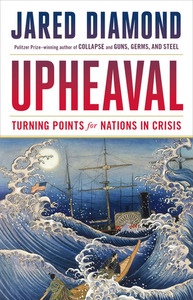Take a photo of a barcode or cover
informative
medium-paced
Adaptation, cooperation, and learning from historical mistakes. Those seem to be the boiled down keys to national as well as personal recovery from traumatic events, although he uses a few more steps, including honest self appraisal, which I wrap up as part of learning from the past. He notes the need to look squarely at history without blaming or avoiding. Those are crucial first steps.
He cites many issues that we know how to solve, but seem unwilling to deal with, like consumption and fisheries management, in particular. These strike me as demonstrating the need to renew our social empathy across the human race, as he points out that we lack a sense of planet wide human identity.
This it seems that community, human community, is at the center of the problem.
He cites many issues that we know how to solve, but seem unwilling to deal with, like consumption and fisheries management, in particular. These strike me as demonstrating the need to renew our social empathy across the human race, as he points out that we lack a sense of planet wide human identity.
This it seems that community, human community, is at the center of the problem.
A magnificent read! So highly recommended. Very well researched and articulated. Makes one wants to go deeper in each aspect mentioned and dig in the references.
I generally like Diamond's books. He makes some interesting points and presents interesting arguments. But, in this case, I'm amazed at how much he uses misrepresentations in making his case; in particular, how much he ignores of the data that would undermine his case. He absolutely does not present his arguments in a way that one could weigh different points of view on subjective issues, but rather presents his own opinions as absolute, irrefutable facts. Additionally, he overstates (exaggerates) and extrapolates some data (or misrepresents statistical processes) in a way that is objectively false. Furthermore, he re-defines even basic words (e.g. the word "science") with his own idealized version of the word, ignoring basic truths (e.g. not every scientific description is above reproof; scientific theories are often disproved by subsequent study or experimentation).
It's intellectually dishonest, and undermines not only this book, but his other writings, as well.
I'm very disappointed by this book.
That said, some of the history recounted in the book is interesting, regardless of whether the points Diamond is making are supportable or not.
It's intellectually dishonest, and undermines not only this book, but his other writings, as well.
I'm very disappointed by this book.
That said, some of the history recounted in the book is interesting, regardless of whether the points Diamond is making are supportable or not.
3.5 stars. An interesting look at nations in crisis and how they adapted to come back from the brink.
Some interesting knowledge and critical insight into the chosen countries but the overall aim of identifying a list of effective strategies for change is not achieved and seems laboured and contrived. Diamond himself outlines the limitations of his methodology in the conclusion! All that said an accessible read with interesting moments.
The most conventional of the "Civilizations Rise and Fall" trilogy, Upheaval takes a more pop-science approach and tone. Because of that, it's easier but less-fulfilling to read.
Diamond uses the psychology of personal crises in order to frame the crisis of large turning points in several countries like the US, China, Japan, and Germany. This framing is less robust and original than his methodology in Guns, Germs, and Steel, or Collapse. In some ways it just recalls older strains of political philosophy and the medieval notion of the "body politic." However, it does provide an easy analogy for relating to dry facts. Which is sort of a main goal of pop-academic at large. *shrug*
I learned some interesting historical facts and dynamics that I haven't see elsewhere, and even crises I was familiar with had some interesting new perspectives. However, unlike Guns, Germs, and Steel, or Collapse, the book didn't affect any of my core beliefs and was more just an enjoyable history lesson.
Diamond uses the psychology of personal crises in order to frame the crisis of large turning points in several countries like the US, China, Japan, and Germany. This framing is less robust and original than his methodology in Guns, Germs, and Steel, or Collapse. In some ways it just recalls older strains of political philosophy and the medieval notion of the "body politic." However, it does provide an easy analogy for relating to dry facts. Which is sort of a main goal of pop-academic at large. *shrug*
I learned some interesting historical facts and dynamics that I haven't see elsewhere, and even crises I was familiar with had some interesting new perspectives. However, unlike Guns, Germs, and Steel, or Collapse, the book didn't affect any of my core beliefs and was more just an enjoyable history lesson.
In this follow-up to Guns, Germs, and Steel and Collapse, Jared Diamond shows how nations have overcome crises through methods individuals often practice in overcoming personal trauma. Through his historical study of Finland, Meiji Japan, Chile, Indonesia, Germany, and Australia and his examination of current crises facing Japan, the US, and the world, Diamond reveals how certain factors like honest self-appraisal and dealing with national failure can help predict resilience. This is a fascinating and informative read that gave me a new perspective on the crises facing our country and our world today. Thank you to Little, Brown for the advance reading copy!
informative
slow-paced





